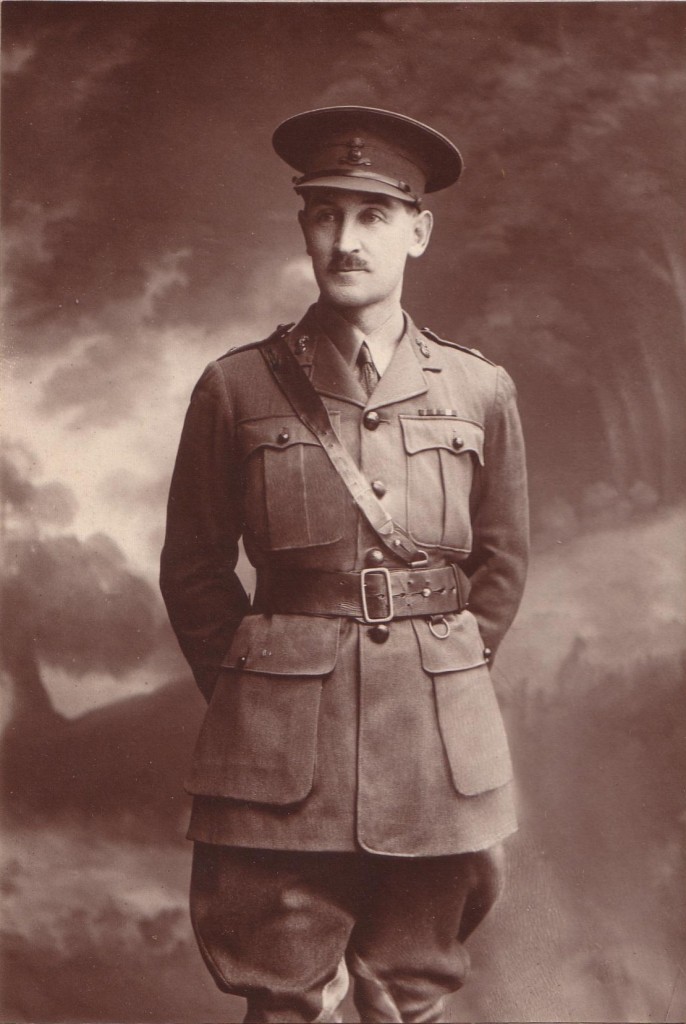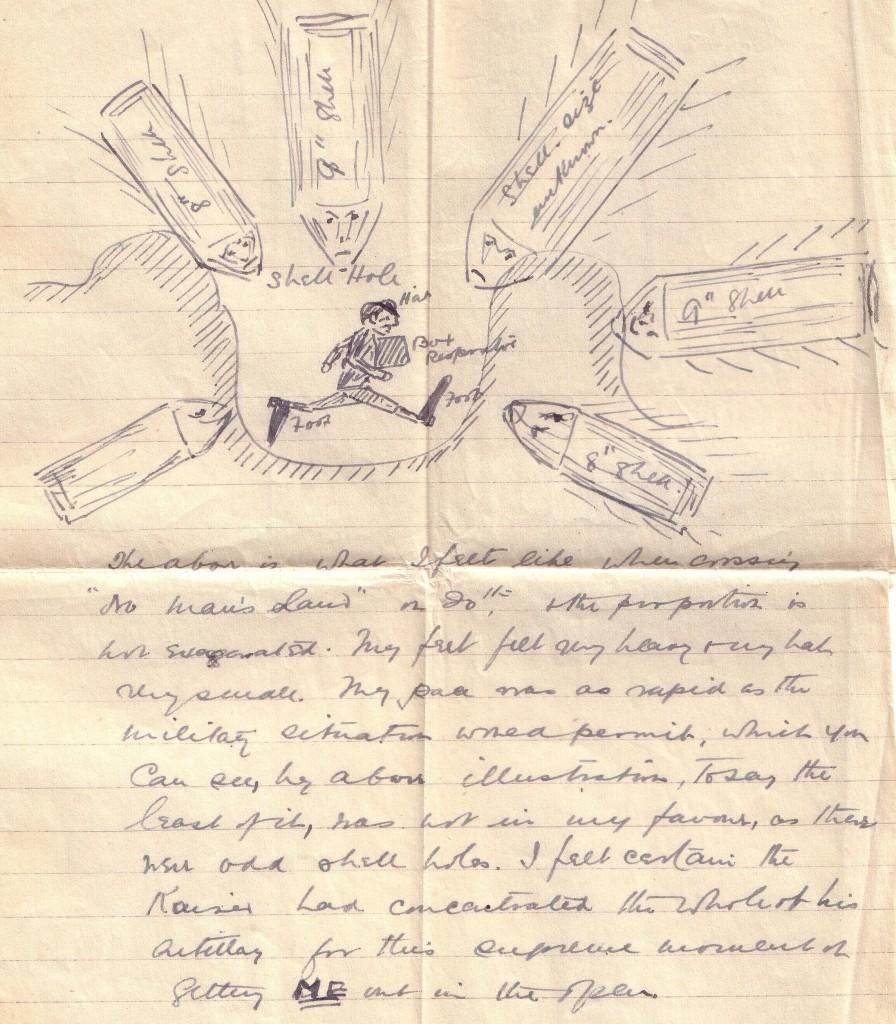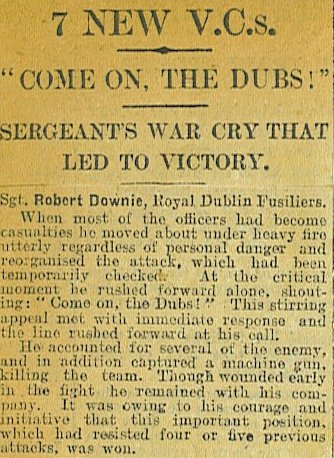Richard Griffith Bassett Jefferys was born on the 10th of January 1876 at Dunmore County Galway. His father, an officer in the army, sent him to England for his education at Bedford School, after which he joined the army, underwent his officers training and was commissioned into the Royal Dublin Fusiliers. He was soon sent to South Africa where during the Boer War he was mentioned in Lord Roberts dispatches whilst attached to the Mounted Infantry. It was 1916 before Jeffreys was first sent to France during the First World War, arriving in Bolougne less than a month before the first day of the Somme offensive, in which he was to personally play little part. However later in the war Jeffreys and his battalion played major roles in battles at Messines and Passachaendaele. which resulted in him being mentioned in dispatches three times, (including once by Sir Douglas Haig). He was awarded the Distinguished Service Order in the new year of 1918 and stayed with the Royal Dublin Fusiliers until their disbandment along with all of the other southern Irish regiments in 1922. With the disbandment of the regiment he had served with for over 20 years, he was sent to the 2nd Battalion North Stafford Regiment where he was appointed second in command. His time with this regiment however was short lived, when during two months leave on the 10th of January 1923 both Jeffreys and his wife Grace, whom he had married in 1909, were killed when the plane in which they were flying crashed near Ajaccio, Corsica.
The following letters are just a small number of those transcribed and published, along with footnotes and additional information in ‘Lieutenant Colonel R. G. B. Jeffreys Collected Letters 1916-1918’ which is available to purchase via this website. For more information please email admin@royaldublinfusiliers.com

Lieutenant Colonel R. G. B. Jeffreys
Lesboeufs
The Line
October 10th 1916
One can’t move about here without a shrapnel helmet and bullets are flying round etc. The air is alive with aeroplanes, one of ours was brought down about 200 yards from my trench this morning. The pilot was badly smashed and suffering from shock and eventually died from the loss of blood. He was wounded in the air and came down all right, but he ran his propeller into a shell hole and turned over. I am properly pigging it now and have not had a wash or a shave or even brushed my teeth for over two days and it will be quite double that time before i will have a chance to do it. Luckily it has been fine since we have been in the line, but it is cold at night. We can take nothing off and I feel very dirty and stuffy. A perpetual roar of shells is going on and no one can sleep night or day.
The Line
October 11th 1916
A most terrific bombardment is going on at the moment, I have never yet heard such a one. We are simply pumping shell after shell into the Hun, it is marvellous to hear it. Of course we are getting it back, but not one 50 part as bad. I was lunching with our Brigadier, with the other commanding officers of the brigade and settling up matters and we had to walk over one mile of country back to our own headquarters in the line, the ground was absolutely one mass of shell holes and you simply stepped from one to another. We really were practically quite safe and none burst nearer than 100 yards of us. Our front line is getting it badly now, but it is extraordinary the few casualties considering all the stuff that is put in. I don’t expect to get any letters for some time to come, one can only just get enough to eat and drink, we are in a country that has been fought over for months and it is difficult getting things up. I have nothing with me except what I stand up in. One of our planes was brought down in flames over the German lines yesterday, just in front of us. When I started digging this place, one unearthed all sorts of relics, Hun equipment, clothing, straw etc. I could not make out what the smell was the first night. I have got my men lying out all over the place now, in any old trench and shell hole, waiting till this present form of amusement (bombardment) is over.
In the Field
October 13th 1916
I got your letter in the middle of a very big battle yesterday ! I never dreamt it could be got through. It was a terrific affair and I am sorry to say that the Brigade suffered severely. It was difficult making out reports and sending messages under such circumstances, wounded were being brought in all the time. The fight went on well into dark and I never lay down till 3 am this morning. We are now being heavily shelled and have just had an officer killed and one extraordinary escape, my signalling officer was with the one that was killed and a piece of shell hit him on the coat pocket breaking his pipe and going right through his note book and money, simply tearing it to pieces. I am afraid this bombardment will account for many more lives. The shells are coming uncomfortably near my headquarters. I have had a few come down today, but it is hard to say till the bombardment is over. My servant was wounded this morning just outside my dug-out. My washing etc. consists of a scrape with a razor and a rub with a damp sponge daily and there it ends, water is scarce and what there is, is nothing to talk about and has to be boiled before drinking. I have not had my clothes off since I have been up in the line and don’t expect to have them off for at least another 10 days to a fortnight. The Boche bombardment is quieting down a little.

One of the letters written home by Jeffreys. This example with a drawing showing how he feels during a bombardment.
In the Field
October 15th 1916
We are having a most uncomfortable time of it just at present and the shells are falling very near and simply falling in scores. One feels the perpetual strain of no sleep. I really have not had any sleep for five nights and we will be here for sometime yet. Shell fire and machine gun fire never cease on this front. Two field guns within a couple of hundred yards have just been knocked out by direct hits.
In the Field
October 17th 1916
We are fighting hard practically everyday now and always a heavy bombardment on. My regiment captured a few prisoners last night and I hope before long we will capture many more. My brigade has had a lot of hard fighting, but so far my regiment has had least casualties, not more than a hundred last week. The brigade has knocked up against some hard places, but we have had a certain amount of luck in not having the same opposition and have gained a little ground, but not very much as yet, as we could not push on too far of the regiments on our flanks, anyway any ground that was taken we still hold, which is always satisfactory. Sniping and machine gun fire is one chief annoyance as far as casualties, although we get a tremendous amount of shelling, they don’t do as much damage as you would expect, men are frequently buried on the trenches, but when dug out are usually not touched, but shaken from shock and when they have been buried 3 or 4 times in the day, they usually get unnerved and have to go away for a rest for a few days. They are wonderful the way they stand it and are as keen as anything to advance and attack although they know the casualties must be great, a wonderful spirit and pluck. I have the greatest admiration for the Irish man, he would far prefer advancing, to sitting in the trenches and being shelled. We have terrific air fights chiefly over the Hun side of the line and one sees a plane falling now and again, but it is hard to say where it is at that distance. We had a lot of Hun planes over us yesterday, but they did not get far over, ours drove them back quickly, all the same they spotted us and gave us a fair amount of shelling.
Division Reserve
October 18th 1916
Well, you know the day we went into the line, the next day we attacked, my battalion supporting and before very long, I had to put two companies into the attack and the one on the right did very well indeed, that on the left had not the same opportunity. The right company and some of the regiment we were supporting, who had suffered heavily pushed our line out about 400 yards and held it consolidating it the same night, it was hard work as our left had not come up in line, having knocked against a very nasty point, which it was impossible to take. This left us a long way in advance of our line and I had to get the left flank of this post thrown back to cover the enemy who had not been driven back and stop him getting at our flank. The post was practically isolated and could only be approached at night and the “runners” were continually being wounded and killed. It was a hard line to hold and was subjected to a heavy shell fire from the enemy and we had a large number of casualties in that part all the time. We were holding it six days. All my battalion were more or less echeloned to the left from this forward post which gave me a very indefinite line to hold, also a very hard one as it made it difficult for patrolling and if patrols and sentries were not very much on the alert, the chances are they might have fired at one another. Well a couple of days after, we had another effort to straighten out our line at night, but the enterprise was not as successful as they hoped, personally, I never expected it to be, however that is neither here nor there, I was told to do it in conjunction with another regiment and I did it, or at least attempted it. It is just a question of if the sacrifice is worth it. Well, then we kept holding the line and being heavily shelled and sniped all the time and considering the amount of firing the casualties were not excessive. Yesterday was my worst day, I cannot get reports in till late. We came out of the line last night and hope to be here for six days and then up again. I got back at 2.30 am this morning and slept till 12.30 pm, the first proper sleep I have had for 8 days or nights and I did enjoy it.
Lesboeufs
October 25th 1916
I was not able to write yesterday, we have been fighting hard and I think the last three nights and two days are quite the hardest I have ever had in my life. The regiment had a hard task and they did it well and covered themselves in glory. They got at the Hun with the bayonet, a thing they were longing to do and I can tell you they had some fighting, just as much as an Irishman wants. The Hun gave no quarter and you can bet our lads did not either and the dead Hun was appalling. I gave orders that no prisoners were to be taken, as I did not want a lot of Boches in the trenches in case of a counter attack and it takes too many men away to send escorts to the rear with them. I also told them not to waste any ammunition, so you can imagine what happened with the bayonet. I got to bed at 5 am this morning and slept till 2pm and am now going to have breakfast 3 pm !!! I will write more fully tomorrow.
Camp
October 26th 1916
Account of Lesboeufs Fighting & taking of Gunpits. I will try and tell you what we have been through since the 22nd. We had one big battle and the regiment excelled themselves and did most splendidly and simply went for the Hun like so many lions, they saw “red” all the time and got at him with the bayonet. The German fought like a beast at bay, but there is not the least doubt that our men are far superior in the manner in which they use their bayonets and the actual hand to hand fighting we rolled them over two to one. It was a splendid fight and when the Hun saw he was properly done, he started throwing up his hands, but it was much too late and none of them got away. Considering the carnage that ensued, we got off with extraordinary light casualties. My battalion was the assaulting battalion with one other in the Brigade (Royal Warwicks) and of course we had our supporting battalion, our support doing exceptionally well and being absolutely on the spot at the critical moment. The “old regiment” has kept up it’s name and added another honour to it’s list. My Brigadier is particularly pleased at the way the regiment acquitted themselves, as also our corps and division commanders, who both congratulated the battalion and the other one in the line with us.
Billets
October 28th 1916
The General had the battalion on parade and congratulated them on their last display in battle, I also had an opportunity of thanking them just before he arrived. I hope to get ample opportunity of getting the battalion well together again and I suppose will get some reinforcements soon. I got seven new officers yesterday. The men are awfully pleased and bucked at their fine display the other day and have all got their tails up. One sportsman took too much wine last night and started “bucking” to four men of another regiment, no doubt putting it well on, it resulted in the four men throwing him down a well, from which he was extracted by the Provost Sergeant who was attracted to the spot by yells of grief mixed with a certain amount of bad language, which frequently brought in the name of the regiment to which the four belonged and which was not at all complimentary !

Newspaper clipping kept by Jeffreys relating to the Victoria Cross action




